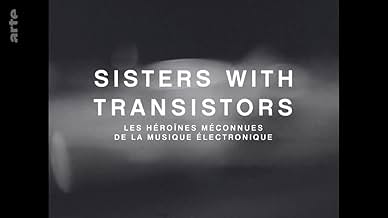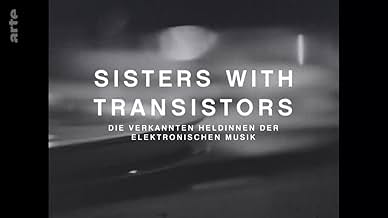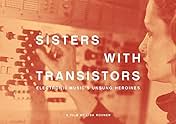Sisters with Transistors
- 2020
- 1h 26m
IMDb RATING
7.4/10
1.1K
YOUR RATING
Follows the story of electronic music's female pioneers, composers who embraced machines and their liberating technologies to utterly transform how we produce and listen to music today.Follows the story of electronic music's female pioneers, composers who embraced machines and their liberating technologies to utterly transform how we produce and listen to music today.Follows the story of electronic music's female pioneers, composers who embraced machines and their liberating technologies to utterly transform how we produce and listen to music today.
- Awards
- 2 wins & 3 nominations total
Kim Gordon
- Self
- (voice)
Jean-Michel Jarre
- Self
- (voice)
Bebe Barron
- Self
- (archive footage)
Clara Rockmore
- Self
- (archive footage)
Louis Barron
- Self
- (archive footage)
Delia Derbyshire
- Self
- (archive footage)
Brian Hodgson
- Self
- (voice)
Maggi Payne
- Self
- (voice)
Daphne Oram
- Self
- (archive footage)
Barry Bermange
- Self
- (archive footage)
- (voice)
Sarah Davachi
- Self
- (voice)
Pauline Oliveros
- Self
- (archive footage)
Pierre Schaeffer
- Self
- (archive footage)
- Director
- Writers
- All cast & crew
- Production, box office & more at IMDbPro
Featured reviews
10jp7570
This film history was LONG overdue and tells the important story of the influential creators in electronic music.
It is true that Wendy Carlos has been one of the most recognized American forces in this genre. When Carlos' break-through popular LP "Switched-On Bach" was released in 1968, it was done so as "Walter Carlos". (Carlos would have gender reassignment surgery in 1972, changing her name to Wendy.) Why bring this up?
The film includes a clip from a French documentary that shows a crowd in the Sam Goody store in NYC in 1968 buying "Switched-On Bach", mentioning it's popularity exceeding even the Beatles. But the English subtitles in that French film refer to Carlos as her. That's correct today, but in 1968 Carlos's work was released under her birth name. How could the French documentary know what was to happen 4 years later? Obviously they didn't - the subtitles had to have been changed long after that documentary was shot. This film should have discretely noted the difference instead of rewriting history, no matter how well-intentioned it may have been. That would take absolutely nothing away from Carlos' talent, creativity and influence.
It is true that Wendy Carlos has been one of the most recognized American forces in this genre. When Carlos' break-through popular LP "Switched-On Bach" was released in 1968, it was done so as "Walter Carlos". (Carlos would have gender reassignment surgery in 1972, changing her name to Wendy.) Why bring this up?
The film includes a clip from a French documentary that shows a crowd in the Sam Goody store in NYC in 1968 buying "Switched-On Bach", mentioning it's popularity exceeding even the Beatles. But the English subtitles in that French film refer to Carlos as her. That's correct today, but in 1968 Carlos's work was released under her birth name. How could the French documentary know what was to happen 4 years later? Obviously they didn't - the subtitles had to have been changed long after that documentary was shot. This film should have discretely noted the difference instead of rewriting history, no matter how well-intentioned it may have been. That would take absolutely nothing away from Carlos' talent, creativity and influence.
"Sisters With Transistors" (2020 release; 86 min.) is a documentary about the female pioneers of electronic music. As the movie opens, one of them comments that "technology is a tremendous liberator", allowing women to work on their own without depending on the approval or assistance of men (who dominate the industry). We then go back in time to the early 20th century and the origins of electronic music. At this point we are 10 min into the movie.
Couple of comments: this is the feature length debut of writer-producer-director Lisa Rovner. She digs deep into the origins of electronic music from the female perspective, and along the way profiles the key pioneers in this subgenre, including amont others Suzanne Ciani, Clara Rockmore, Delia Derbyshire, Pauline Oliveros, Wendy Carlos, and Laurie Spiegel. The movie does not go beyond the mid-70s, and hence no Laurie Anderson (who is the documentary's narrator). The documentary reminds us how incredibly controversial electronic music was. In fact, it wasn't referred to as "music" in the early days, but instead it was called things like "sonic propositions", and "electronic tonalities". Can you imagine that? The other thing that struck me while watching this, is how much archive footage the film makers were able to dig up on this, absolutely incredible. As a fan of electronic music going back to the early days of artists like Tangerine Dream and Klaus Schulze (yes, I know, all guys), I was more than delighted with the insights provided by this documentary.
"Sisters With Transistors" premiered at the 2020 SXSW festival to immediate acclaim. There is good reason why this documentary is rated 97% fresh on Rotten Tomatoes. It played very briefly here in Cincinnati at some point in 2021 and I kicked myself for having missed it. Thankfully, the documentary recently started streaming on Showtime On Demand and Showtime Anytime, where I caught it. If you have any interest in electronic music whatsoever, I'd readily suggest you check this out, and draw your own conclusion. I guarantee you won't be disappointed.
Couple of comments: this is the feature length debut of writer-producer-director Lisa Rovner. She digs deep into the origins of electronic music from the female perspective, and along the way profiles the key pioneers in this subgenre, including amont others Suzanne Ciani, Clara Rockmore, Delia Derbyshire, Pauline Oliveros, Wendy Carlos, and Laurie Spiegel. The movie does not go beyond the mid-70s, and hence no Laurie Anderson (who is the documentary's narrator). The documentary reminds us how incredibly controversial electronic music was. In fact, it wasn't referred to as "music" in the early days, but instead it was called things like "sonic propositions", and "electronic tonalities". Can you imagine that? The other thing that struck me while watching this, is how much archive footage the film makers were able to dig up on this, absolutely incredible. As a fan of electronic music going back to the early days of artists like Tangerine Dream and Klaus Schulze (yes, I know, all guys), I was more than delighted with the insights provided by this documentary.
"Sisters With Transistors" premiered at the 2020 SXSW festival to immediate acclaim. There is good reason why this documentary is rated 97% fresh on Rotten Tomatoes. It played very briefly here in Cincinnati at some point in 2021 and I kicked myself for having missed it. Thankfully, the documentary recently started streaming on Showtime On Demand and Showtime Anytime, where I caught it. If you have any interest in electronic music whatsoever, I'd readily suggest you check this out, and draw your own conclusion. I guarantee you won't be disappointed.
This is a well crafted documentary on the contributions of a handful notable women to early electronic music. Up through the 1960's, electronic music was effectively all experimental and this documentary focuses on this side of the medium. (So don't expect any dance music-what many people think of when they think of electronic music now days.) About the only complaint I would make about this film is something which is a common challenge for many creative works: I felt it started to lose momentum toward the end and dragged out a bit longer than it needed to.
But only with more diversity of women.
An article made me aware that this movie only features western European descendent or white women.
While it is an omage to people being overlooked it overlooks others.
A woman to many people is still mainly a white woman.
But even in electronic music there were many women of none European descendent who contributed.
I am myself fascinated with the amount of women in electronic music and this movie came out when I started to understand that I as a woman feel home in modular synthesis and electronic music.
Even more fascinated was I when seeing that there were woman like me before literally pioneering the field I feel home in.
Even more women who were and think or thought like me. Like role models I was always craving as I grew up.
I don't look at people based on their appearance. To me every woman is a woman and I was flattered seeing other women doing wonderful things. But know I am left wondering why there are only white women in the movie.
I don't think anyone had any racial intention here. It is just the white women were more easily to be rediscovered. But there are so many more out there. Women of all cultures.
It is only reflecting how much more powerful we women are if we keep digging deeper.
The reasons women of color are overlooked are the same why women in general were oberlooked. Stereotypes.
Now they try to break with stereotypes of white women thinking they were representing all women. But no.
This movie is an attempt to break with stereotyoes but it is not going far enough and is deepening stereotypes.
To be honest, I was a bit bored by the movie. I felt there was so much more to all those stories of great women and at some point I felt the makers ran out of money or so.
I think if more money would gave been 8nvested they could have and wpuld have be allowed to dig deeper.
The trailer was great, but the movie lacked the same power.
If this had been a documentry about men much more money would have been invested toshow their stories in the exciting way it was.
I recommend the movie, because for it to be of so much importance. But I believe this is just the beginning of something bigger giving all the talented women of electronic music the light they deserve to be represented in no matter what origine they were or are.
7 stars for I love how the existence of that movie moticate me becoming a woman of electronic music.
An article made me aware that this movie only features western European descendent or white women.
While it is an omage to people being overlooked it overlooks others.
A woman to many people is still mainly a white woman.
But even in electronic music there were many women of none European descendent who contributed.
I am myself fascinated with the amount of women in electronic music and this movie came out when I started to understand that I as a woman feel home in modular synthesis and electronic music.
Even more fascinated was I when seeing that there were woman like me before literally pioneering the field I feel home in.
Even more women who were and think or thought like me. Like role models I was always craving as I grew up.
I don't look at people based on their appearance. To me every woman is a woman and I was flattered seeing other women doing wonderful things. But know I am left wondering why there are only white women in the movie.
I don't think anyone had any racial intention here. It is just the white women were more easily to be rediscovered. But there are so many more out there. Women of all cultures.
It is only reflecting how much more powerful we women are if we keep digging deeper.
The reasons women of color are overlooked are the same why women in general were oberlooked. Stereotypes.
Now they try to break with stereotypes of white women thinking they were representing all women. But no.
This movie is an attempt to break with stereotyoes but it is not going far enough and is deepening stereotypes.
To be honest, I was a bit bored by the movie. I felt there was so much more to all those stories of great women and at some point I felt the makers ran out of money or so.
I think if more money would gave been 8nvested they could have and wpuld have be allowed to dig deeper.
The trailer was great, but the movie lacked the same power.
If this had been a documentry about men much more money would have been invested toshow their stories in the exciting way it was.
I recommend the movie, because for it to be of so much importance. But I believe this is just the beginning of something bigger giving all the talented women of electronic music the light they deserve to be represented in no matter what origine they were or are.
7 stars for I love how the existence of that movie moticate me becoming a woman of electronic music.
This is the story of early electronic music, experimental electronic music, women's role in electronic music, and in general, a story about how hard women had to work to get any recognition.
I know people are tired of social justice issues, but the marginalization of women is very real, been going on since the dawn of man, and is still present. So I think that message is on point.
But I want to talk about the electronic music. As a lifelong fan of electronics in music, and unique sounds, and non standard music, like Forbidden Planet, this documentary does a good job of trying to vocalize why people would be involved in this.
These women were rebels. They found electronic music liberating. Each of them went about things differently though. One woman created an electronic version of a piece of music that's been heard by millions of people, and is of course deeply associated with the sci fi show Doctor Who. One did installation art, where you had to be there, to understand what she was trying to do. One found a niche doing mainly commercials. One woman created the first electronic score for a motion picture. One worked with computers as a tool for creating electronic music. Etc.
I knew about some of these women, but not others. And hearing in their own words, their views on making electronic music, is of course very interesting.
Watch this with an open mind I guess, or if that's not possible, I guess don't watch it.
I know people are tired of social justice issues, but the marginalization of women is very real, been going on since the dawn of man, and is still present. So I think that message is on point.
But I want to talk about the electronic music. As a lifelong fan of electronics in music, and unique sounds, and non standard music, like Forbidden Planet, this documentary does a good job of trying to vocalize why people would be involved in this.
These women were rebels. They found electronic music liberating. Each of them went about things differently though. One woman created an electronic version of a piece of music that's been heard by millions of people, and is of course deeply associated with the sci fi show Doctor Who. One did installation art, where you had to be there, to understand what she was trying to do. One found a niche doing mainly commercials. One woman created the first electronic score for a motion picture. One worked with computers as a tool for creating electronic music. Etc.
I knew about some of these women, but not others. And hearing in their own words, their views on making electronic music, is of course very interesting.
Watch this with an open mind I guess, or if that's not possible, I guess don't watch it.
Did you know
- Quotes
Suzanne Ciani: I couldn't get a record deal, but advertisers wanted to be on the edge.
- Alternate versionsarte television aired a 53 minute version of this documentary.
- ConnectionsReferences Forbidden Planet (1956)
- How long is Sisters with Transistors?Powered by Alexa
Details
- Release date
- Countries of origin
- Language
- Also known as
- Elektronik Kız Kardeşler
- Production companies
- See more company credits at IMDbPro
Box office
- Budget
- £500,000 (estimated)
- Gross worldwide
- $5,241
- Runtime
- 1h 26m(86 min)
- Color
- Aspect ratio
- 1.33 : 1
Contribute to this page
Suggest an edit or add missing content



























